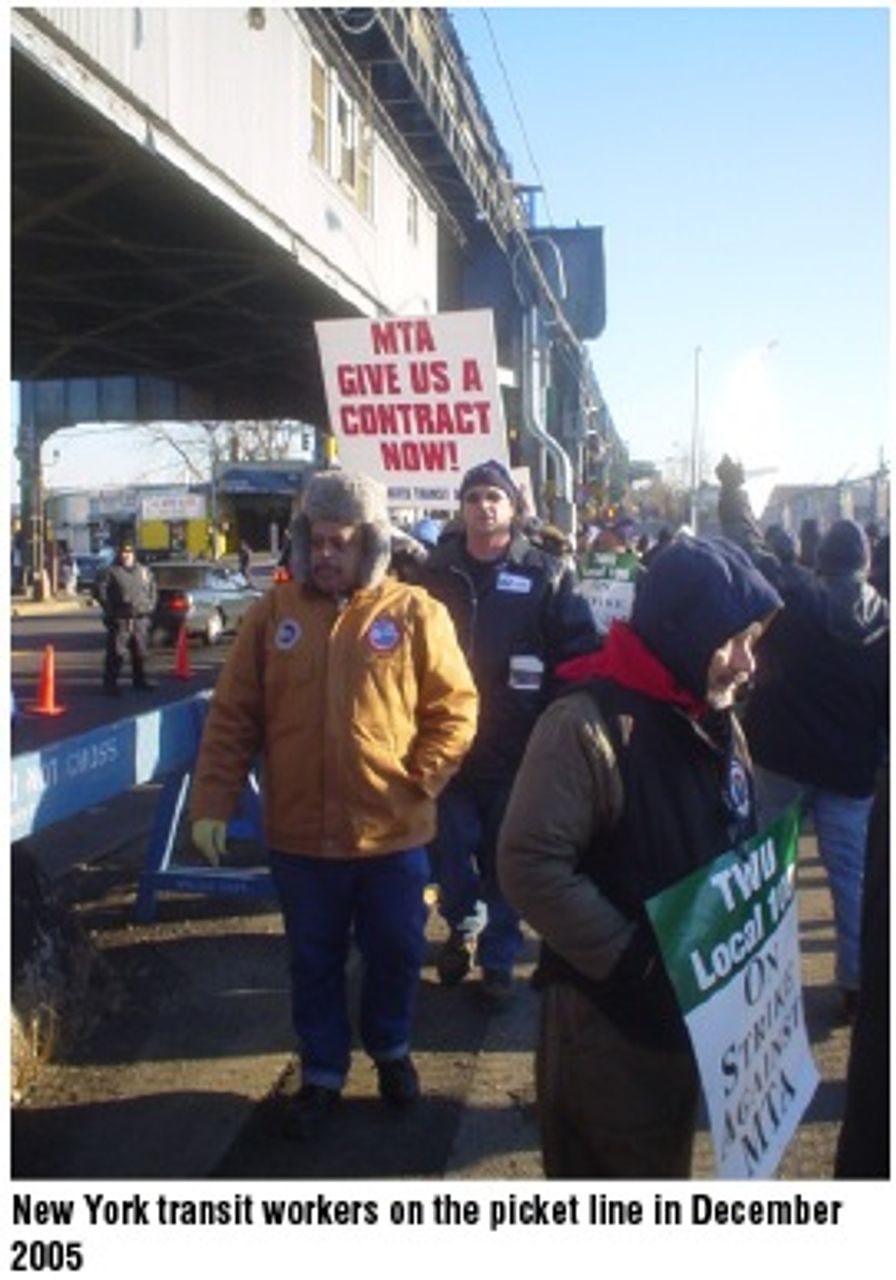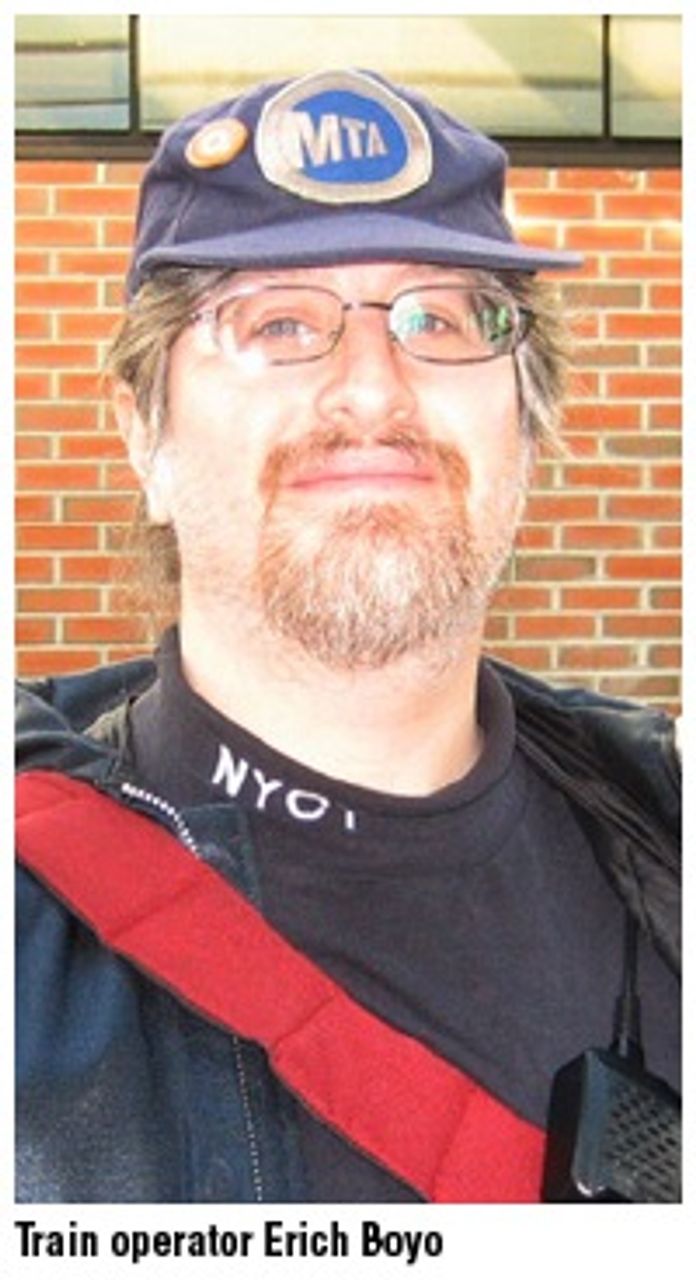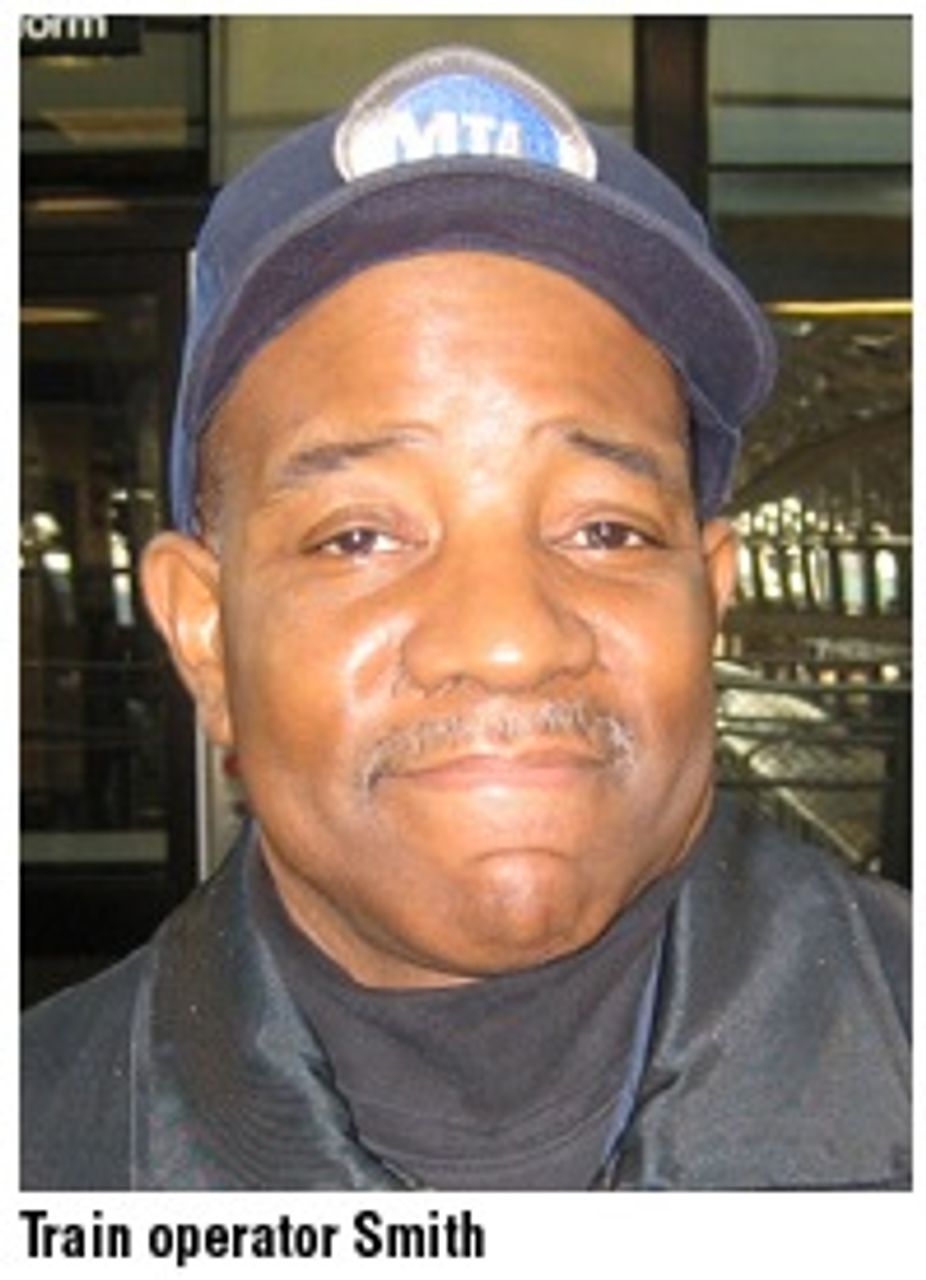Barely two months before a contract deadline for New York City's 38,000 transit workers and as the transit authority announces plans for unprecedented cutbacks, the transit union's president has signed a court affidavit surrendering the right to strike and promising never to walk out again.
Transport Workers Union Local 100 President Roger Toussaint signed the no-strike pledge as part of a deal between the city and the TWU bureaucracy to restore dues check-off, the automatic deduction of union dues from workers paychecks.
 After it staged a three-day strike in December 2005, the union lost dues check-off as part of the sanctions imposed under New York State's anti-strike Taylor Law, which bars walkouts by public employees. In addition it was hit with a $2.5 million fine.
After it staged a three-day strike in December 2005, the union lost dues check-off as part of the sanctions imposed under New York State's anti-strike Taylor Law, which bars walkouts by public employees. In addition it was hit with a $2.5 million fine.
The court affidavit signed by Toussaint, states, "The Union does not assert the right to strike against any government, to assist or participate in any such strike, or to impose an obligation to conduct, assist, or participate in such a strike, and that the Union has no intention, now or in the future, of conducting, assisting, participating, or imposing an obligation to conduct, assist or participate in any such strike, or threatening to do so, against the plaintiffs or any governmental employer."
In return for Toussaint's no-strike pledge, New York State Supreme Court Judge Bruce Balter, on November 10, restored the union's dues check-off privilege, authorizing the transit agency to collect the dues money from each member's paycheck for deposit in the union's treasury. It is estimated that the total amount going to the union in dues is about $1.5 million a month.
Toussaint's explicit renunciation of the right to strike was welcomed by the city administration of billionaire Republican Mayor Michael Bloomberg, which previously had voiced strong opposition to restoring the dues collection system.
"We are not going to oppose getting their check-off back because they have finally done what the law and the court said they have to do, which is say, ‘We will not strike again' ", Michael Cardozo, the city's corporation counsel, told the New York Times. Attorney General Andrew Cuomo representing the transit agency also submitted papers supporting the reinstatement of dues check-off.
Toussaint's affidavit is significantly different from one that he submitted in September, 2007, in which he only recognized that the union did not have the legal right to strike, (a fact which was never in dispute, given the provisions of the Taylor Law), and failed to promise, as in his latest statement, that the union would carry out no future walkouts.
Toussaint gave his no-strike pledge to the courts on October 21, a week after the state Appellate Division issued a unanimous decision that it was not necessary that the rest of the 48 members of the union's executive board also sign affidavits, as Judge Balter had previously demanded. However, it upheld Balter's demand that the union president sign an affidavit, supported by the executive board, pledging that the union would never again call a walkout.
The Local 100 leadership was forced to call the three-day strike, which shut down New York City's mass transit system in 2005, by the deep-seated anger and militancy among the rank and file. Transit workers rejected the bid by the MTA (Metropolitan Transportation Authority), backed by Bloomberg and Wall Street, to roll back pensions and other benefits and were determined to fight back against falling real wages and on-the-job abuse.
While the strike successfully shut down the subway and bus system and effectively brought the city to a halt, the strikers were isolated by their own union—the TWU international leadership declared the walkout illegal and demanded that workers take down their picket lines. The union trade union bureaucracy in New York City and nationally did nothing to defend transit workers against threats of massive fines, jailings and mass firings.
The Toussaint leadership itself was unprepared for the assault launched by the city and state against the strike and had vainly hoped for the supposed "friends of labor" in the Democratic Party to intervene on the union's behalf. When no such support was forthcoming, the Local 100 bureaucracy organized a hasty return to work without a contract.
After the strike, when the union leadership negotiated a take-away contract, the majority of the Local 100 membership voted it down, only to have the same terms that they rejected imposed by a state arbitrator.
The bitterness over the failure of the union to wage a successful strike, found concrete expression following the yanking of dues check-off 17 months ago. Since then, it has been reported that only about half of Local 100's membership have paid dues to the union.
The contract dictated by the arbitrator expires January 15 and the union has issued its no-strike pledge in the midst of negotiations with the MTA on a new agreement.
There is no doubt that the MTA will push for even deeper concessions in this round of bargaining than it sought three years ago.
The MTA is facing declining tax revenues from corporations and real estate, both hard hit by the financial meltdown, as well as the cut off of additional subsidies from the state and city, both of which are confronting their own budgetary crises. Meanwhile, 20 percent of the agency's $10 billion budget is going to pay "debt service" to wealthy investors on tens of billions of dollars in bonds.
New York's Democratic Governor David Paterson has called for, "shared sacrifice, difficult choices and cooperation from all funding partners", to confront the state's fiscal crisis. Clearly not included in this "shared sacrifice" are the rich—as the governor has excluded any tax hikes on the very wealthy—and no public figure has suggested a halt to interest payments to the transit system's bondholders.
MTA CEO, Elliot Saunders, has vowed to carry out "draconian" budget cuts and fare hikes to bridge a $1.2 billion budget gap. Proposals expected to be aired this week include the elimination of 1,500 workers' jobs, the shutting down of entire subway and bus lines, a hike in the fare from the current $2 to as much as $3 by next summer and contract terms that will slash benefits and impose a cut in real wages for transit workers.
The Toussaint leadership's surrender of the right to strike amounts to a declaration that it has no intention of leading a struggle against these attacks. Instead, the bureaucracy is trying to secure its own privileges, in particular the dues base that funds its salaries and perks, by helping to impose the conditions demanded by the MTA and its bondholders on the workers.
 The World Socialist Web Site spoke to train operators at the Stillwell Avenue station in Brooklyn. Many expressed their concern and anger over the union's no-strike pledge.
The World Socialist Web Site spoke to train operators at the Stillwell Avenue station in Brooklyn. Many expressed their concern and anger over the union's no-strike pledge.
Train operator Erich Boyo, 48, a transit worker for 16 years said, "The no strike pledge takes away a valuable tool. No one likes striking, but sometimes it's the only option. We do not have many other options especially since the transit authority is stonewalling us during these negotiations.
"When you do go on strike, you have to do it all the way. This means not getting a contract with givebacks or with raises that fall below the cost of living in New York City, which is what happened three years ago. Toussaint is like a caricature of Theodore Roosevelt charging half the way up San Juan Hill, and then saying, ‘Ah, that's enough'.
"Three years ago, there was a mood for a strike, and people thought he was going to fight all the way. The strike should have resulted in improved living standards, not the reduction that we ended up getting.
"At that time, the MTA had a monetary surplus, and even after going on strike, we still got a bad contract. Now they are crying poverty, and without having even the threat of a strike, our bargaining power is seriously weakened.
"I think Toussaint doesn't want to go to jail or be fined, but that is part of what it takes to be a union leader. His so-called militant days are over. We must not get fooled again."
 Train operator Smith, a transit worker for 21 years, told the WSWS, "I hate the no-strike pledge. Our hands are now all tied up, and we have no way to fight back. Toussaint did it because he wants that money to go to the union hall. I have been paying my dues, but I understand that about half the members have not been paying.
Train operator Smith, a transit worker for 21 years, told the WSWS, "I hate the no-strike pledge. Our hands are now all tied up, and we have no way to fight back. Toussaint did it because he wants that money to go to the union hall. I have been paying my dues, but I understand that about half the members have not been paying.
"A weak union is better than none, but will the union do something when they get the dues money? No, they will do nothing.
"Things are not getting better. Many supervisors want to write you up for everything. This is what is happening to workers all over. Look at the workers at GM, and Circuit City who are facing layoffs. This will lead to more foreclosures.
"In the meantime look at AIG after they got their bailout. They had a big party and went playing on a golf course."
Subscribe to the IWA-RFC Newsletter
Get email updates on workers’ struggles and a global perspective from the International Workers Alliance of Rank-and-File Committees.
